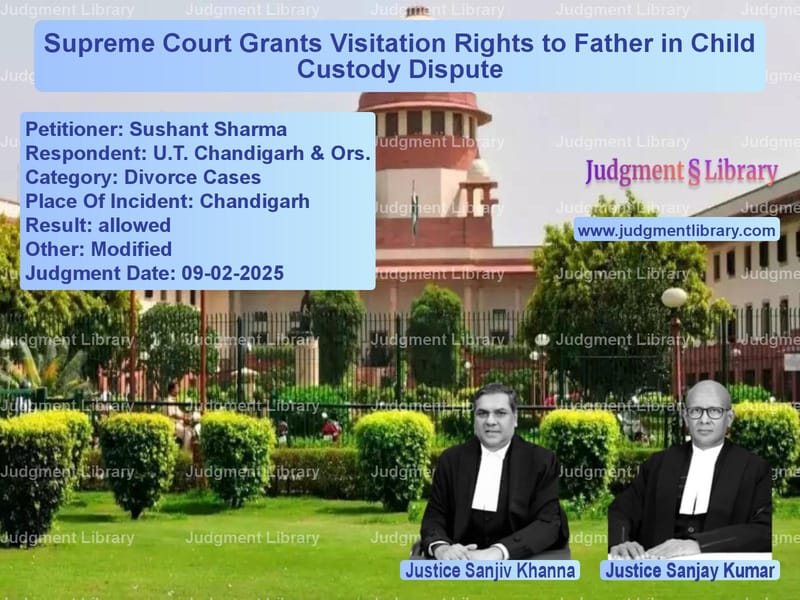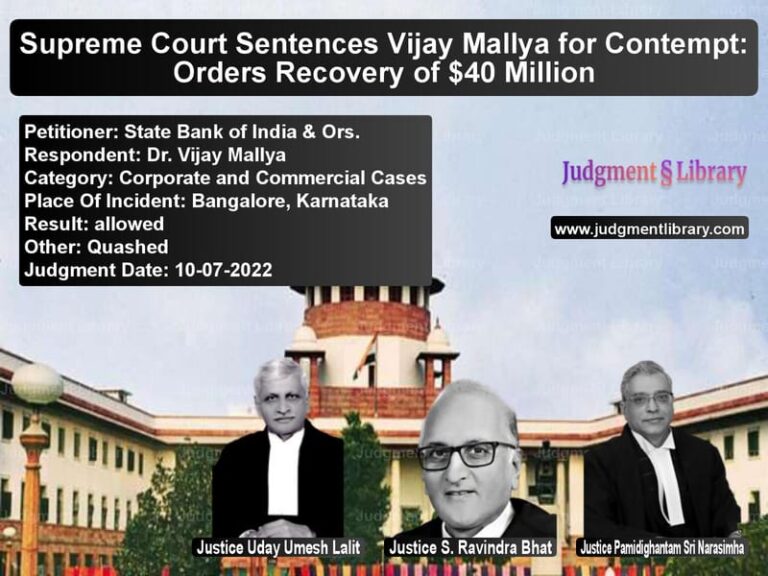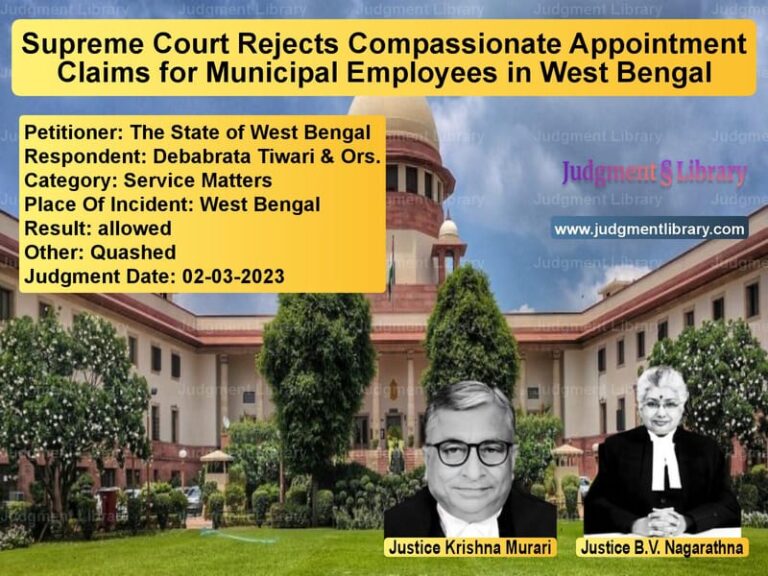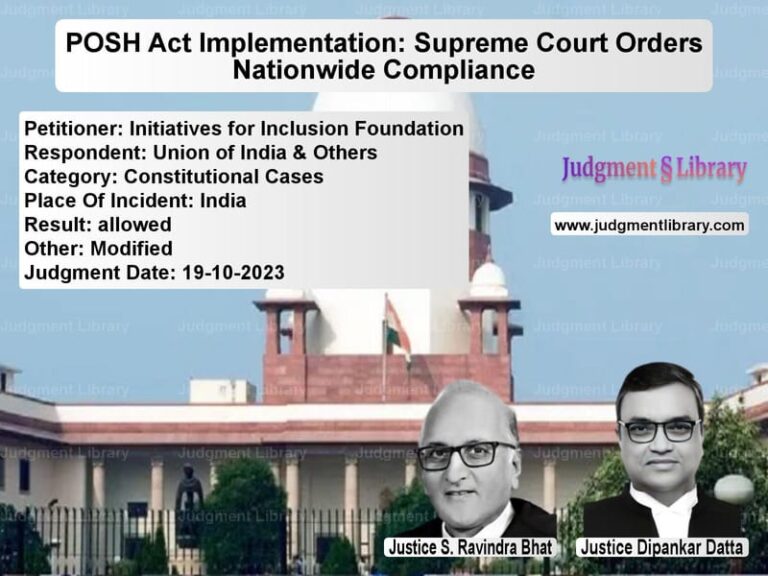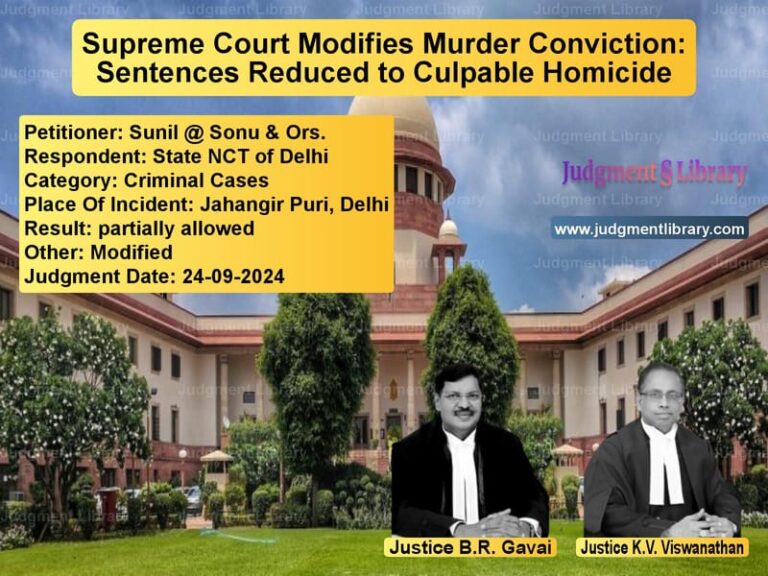Supreme Court Grants Visitation Rights to Father in Child Custody Dispute
The case of Sushant Sharma vs. U.T. Chandigarh & Ors. revolves around a prolonged legal battle over the custody and visitation rights of a minor child. The appellant, Sushant Sharma, approached the Supreme Court after being denied access to his son despite multiple legal proceedings. The Supreme Court ruled in his favor, granting him visitation rights while maintaining restrictions on the child’s movement outside the country.
Background of the Case
The appellant, Sushant Sharma, is the biological father of the minor child (name suppressed for privacy). After a marital dispute and subsequent legal actions, he was denied access to his son by the child’s legal guardian. Sharma challenged this in court, seeking the right to interact with and meet his child. The case involved multiple legal proceedings, including civil suits regarding property disputes and the legal status of the child’s guardianship.
Key issues in the case:
- Denial of visitation rights to the biological father.
- Legal authority over the child’s guardianship.
- Allegations of interference by third parties in the child’s custody.
- Restrictions on the child’s travel outside the country.
Legal Proceedings and High Court Ruling
The case was initially heard by the Punjab and Haryana High Court, which ruled in favor of the existing guardian, limiting Sharma’s access to his child. The decision was based on a report by a Court Commissioner, who had interacted with the child and noted concerns over potential disruptions in the child’s environment.
The High Court’s ruling included:
- Restricting Sharma’s visitation rights.
- Upholding the guardian’s authority over the child.
- Rejecting Sharma’s plea to take his son outside India.
Aggrieved by this decision, Sharma approached the Supreme Court, arguing that his rights as a father were being unfairly curtailed.
Arguments Before the Supreme Court
Petitioner’s (Sushant Sharma) Arguments
Sharma’s legal counsel contended:
- As the biological father, he had a fundamental right to interact with and care for his child.
- The restrictions imposed by the High Court were excessive and lacked justification.
- The Court Commissioner’s report was biased and failed to consider the best interests of the child.
- Legal guardianship proceedings under the Guardians and Wards Act, 1890, were already pending, and the High Court’s ruling preempted these proceedings.
- The child’s assets were being managed without his involvement, raising concerns about financial mismanagement.
Respondents’ Arguments
The respondents, including the child’s legal guardian and representatives of U.T. Chandigarh, argued:
- The child’s well-being was the primary concern, and limiting Sharma’s access was necessary to maintain stability.
- Previous interactions between Sharma and the child had caused emotional distress.
- Legal proceedings regarding guardianship were pending, and the Supreme Court should not intervene prematurely.
- Any decision allowing Sharma to travel abroad with the child could complicate legal matters.
Supreme Court’s Observations
The Supreme Court bench, comprising Chief Justice Sanjiv Khanna and Justice Sanjay Kumar, examined the case and ruled in favor of Sharma’s visitation rights while imposing safeguards. The Court emphasized the fundamental right of a parent to interact with their child and criticized the restrictive approach adopted by the High Court.
“The right of a parent to meet and interact with their child cannot be arbitrarily denied. The best interest of the child requires balanced interaction with both parents.”
The Court made the following key observations:
- The father’s involvement in the child’s life was essential for emotional development.
- Legal guardianship proceedings should not be a basis to restrict parental rights.
- The previous restrictions imposed were excessive and required modification.
- A Court Commissioner should be appointed to oversee and ensure fair implementation of visitation rights.
Final Judgment
The Supreme Court ruled:
- Sushant Sharma was granted visitation rights and allowed to interact with his son.
- The child was not to be taken outside the country without court approval.
- Other family members who previously interacted with the child were also allowed access.
- The child’s assets could not be transferred, alienated, or encumbered until further legal proceedings.
- A Court Commissioner, Mr. Chritarth Palli, was appointed to oversee the visitation process.
- CCTV cameras were to be installed at designated locations in the child’s residence to ensure compliance.
- The legal expenses for the Court Commissioner were to be borne by Sharma.
Key Takeaways
- Parental Rights Upheld: The ruling affirms that parental rights cannot be unreasonably curtailed.
- Judicial Oversight on Child Custody: Courts must ensure that custody disputes prioritize the child’s welfare while respecting parental involvement.
- Legal Guardianship and Asset Protection: The Court imposed restrictions on asset transfers to prevent financial misuse.
- Fair Visitation Rights: The appointment of a Court Commissioner ensures compliance and prevents further disputes.
Conclusion
The Supreme Court’s judgment reinforces the principle that a child’s best interests include meaningful interaction with both parents. By granting Sharma visitation rights while ensuring necessary safeguards, the ruling strikes a balance between parental rights and the child’s well-being.
Petitioner Name: Sushant Sharma.Respondent Name: U.T. Chandigarh & Ors..Judgment By: Justice Sanjiv Khanna, Justice Sanjay Kumar.Place Of Incident: Chandigarh.Judgment Date: 09-02-2025.
Don’t miss out on the full details! Download the complete judgment in PDF format below and gain valuable insights instantly!
Download Judgment: sushant-sharma-vs-u.t.-chandigarh-&-or-supreme-court-of-india-judgment-dated-09-02-2025.pdf
Directly Download Judgment: Directly download this Judgment
See all petitions in Child Custody
See all petitions in Alimony and Maintenance
See all petitions in Property Division in Divorce Cases
See all petitions in Domestic Violence
See all petitions in Judgment by Sanjiv Khanna
See all petitions in Judgment by Sanjay Kumar
See all petitions in allowed
See all petitions in Modified
See all petitions in supreme court of India judgments February 2025
See all petitions in 2025 judgments
See all posts in Divorce Cases Category
See all allowed petitions in Divorce Cases Category
See all Dismissed petitions in Divorce Cases Category
See all partially allowed petitions in Divorce Cases Category

